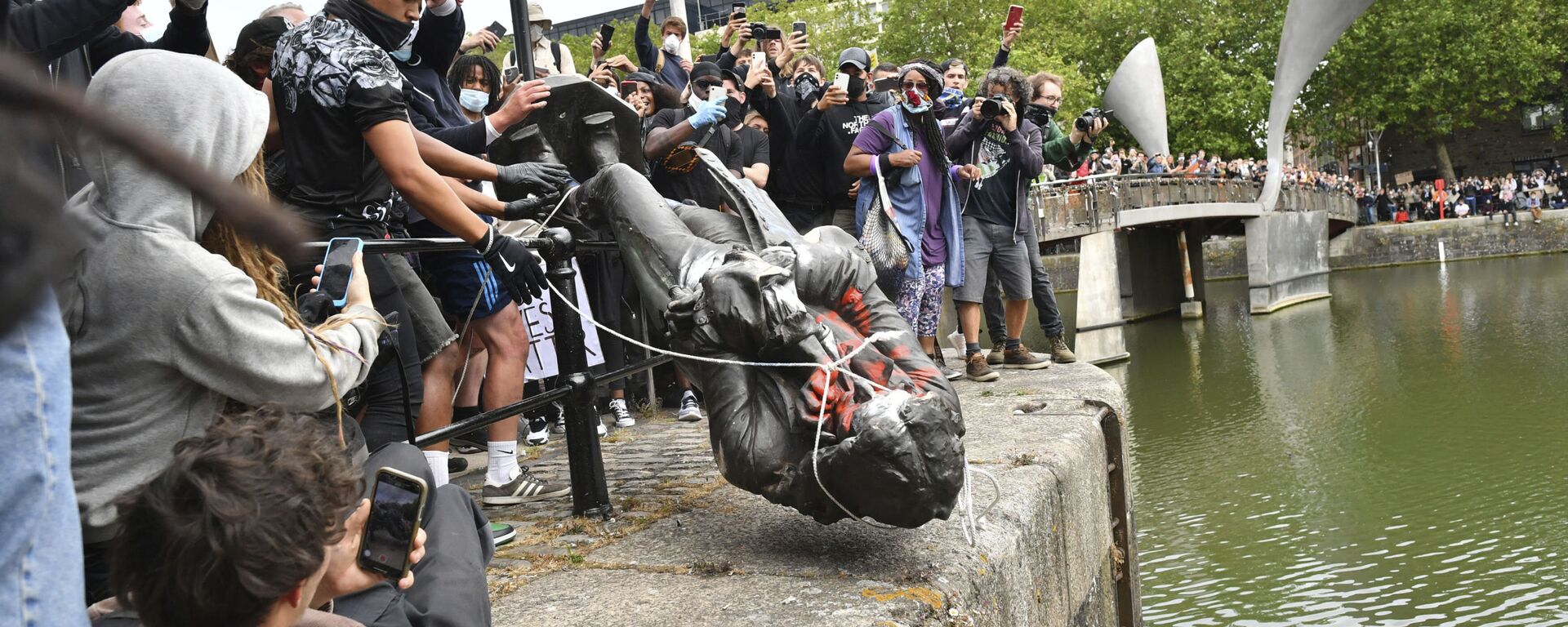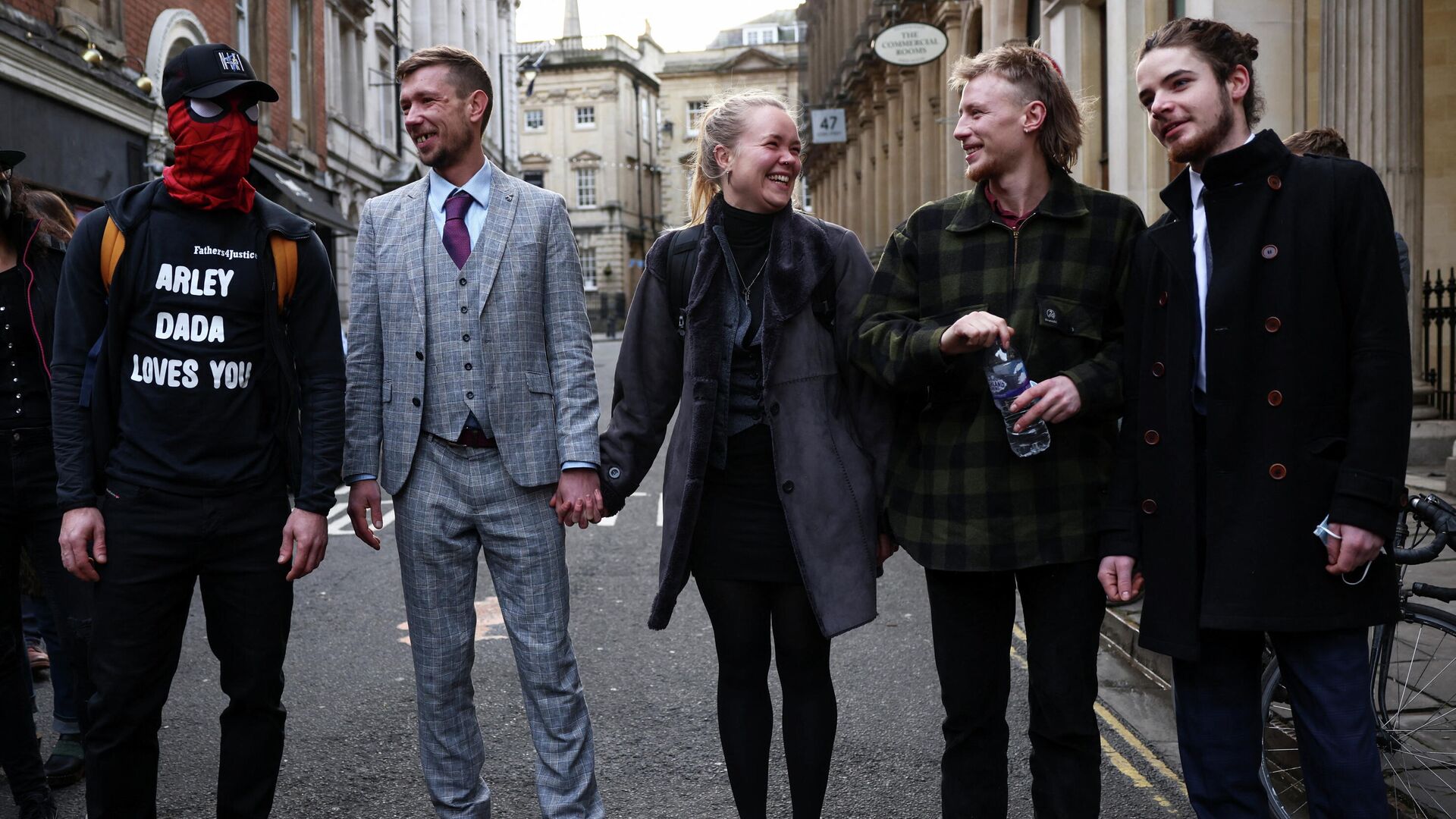https://sputnikglobe.com/20220107/uk-attorney-general-may-refer-colston-4-case-to-appeals-court-to-clarify-vandalism-law-1092092459.html
UK Attorney General may Refer ‘Colston 4’ Case to Appeals Court to ‘Clarify’ Vandalism Law
UK Attorney General may Refer ‘Colston 4’ Case to Appeals Court to ‘Clarify’ Vandalism Law
Sputnik International
The statue of Edward Colston, a famed Bristol merchant and philanthropist who was involved in the slave trade trade, was pulled down and thrown into the city's... 07.01.2022, Sputnik International
2022-01-07T14:52+0000
2022-01-07T14:52+0000
2023-05-28T15:17+0000
britain
great britain
uk court of appeal
blm
vandalism
black lives matter
bristol
statue
suella braverman
winston churchill
https://cdn1.img.sputnikglobe.com/img/07e6/01/07/1092093807_0:0:2959:1665_1920x0_80_0_0_3da909c752257ea7b522582c14db0833.jpg
The British government's top lawyer is considering referring the acquittal of four defendants in the toppling of the statue of Bristol merchant Edward Colston to the Court of Appeal.The jury at Bristol Crown Court found Rhian Graham, Milo Ponsford, Jake Skuse and Sage Willoughby not guilty of criminal damage on Thursday, despite video evidence showing them pulling down the statue of the 17th-century slave trader.Double jeopardy laws mean the so-called 'Colston Four' activists cannot be re-tried for the June 7 2020 incident at a Black Lives Matter (BLM) protest in the south-western city.But Attorney General Suella Braverman said in a tweet on Fruday she could ask judges to "clarify the law," saying the verdict had caused "confusion"."Without affecting the result of this case, as Attorney General, I am able to refer matters to the Court of Appeal so that senior judges have the opportunity to clarify the law for future cases," she added. "I am carefully considering whether to do so."Attorneys general for England and Wales act as legal advisors to the government but do not run the judicial system or the prosecution service as in other countries. Those roles fall to the justice secretary and the director of public prosecutions, a post previously held by opposition Labour party leader Sir Starmer.The verdict has drawn widespread criticism from conservative MPs and media figures who argue it would persuade others they can vandalise public monuments with impunity if they claim a political motive.During the wave of protests in sympathy with the US BLM movement in the summer of 2020, anti-fascist demonstrators defaced the Whitehall Cenotaph, the UKs central memorial to those who gave their lives in wars, including in the Second World War against the Nazi-led Axis.Statues of wartime leader Sir Winston Churchill and pacifist Indian liberation struggle leader Mohandas K. Gandhi in Westminster were also attacked with graffiti claiming they were "racist".The statue, still defaced with red spray paint and bearing unrepaired damage from the from the June 2020 incident, was put on exhibition at Bristol's M-Shed museum a year later — drawing protests from the Save Our Statues campaign.Colston was a successful 17th-century merchant, member of Parliament for the early incarnation of the Tory party and philanthropist who paid for the building of schools, hospitals, churches and houses for the poor in Bristol and London.He was a member of the Royal African Company, the British monopoly in the trans-Atlantic slave trade, from 1680 to 1692, and was its deputy governor in 1689-90.Britain played a central role in the Atlantic slave trade, begun by Portugal in the 15th century, as it grew into a great maritime and colonial power — before abolishing slavery in the early 19th century and using its naval dominance to suppress the trade. The wealth accumulated from slavery bankrolled the industrial revolution, which began with mills waving cotton grown by slaves in the Americas.Many British political figures and military heroes, including Sir Francis Drake, Lord Horatio Nelson and John Edward Taylor, the founder of liberal newspaper The Guardian, were either directly involved in the human trade or profited from investments in it.
https://sputnikglobe.com/20220106/uk-mps-slam-verdict-in-colston-statue-case-as-woke-argue-it-legitimises-vandalism--1092055635.html
britain
great britain
bristol
united kingdom (uk)
Sputnik International
feedback@sputniknews.com
+74956456601
MIA „Rossiya Segodnya“
2022
James Tweedie
https://cdn1.img.sputnikglobe.com/img/07e4/08/1c/1080307270_0:3:397:400_100x100_80_0_0_7777393b9b18802f2e3c5eaa9cbcc612.png
James Tweedie
https://cdn1.img.sputnikglobe.com/img/07e4/08/1c/1080307270_0:3:397:400_100x100_80_0_0_7777393b9b18802f2e3c5eaa9cbcc612.png
News
en_EN
Sputnik International
feedback@sputniknews.com
+74956456601
MIA „Rossiya Segodnya“
Sputnik International
feedback@sputniknews.com
+74956456601
MIA „Rossiya Segodnya“
James Tweedie
https://cdn1.img.sputnikglobe.com/img/07e4/08/1c/1080307270_0:3:397:400_100x100_80_0_0_7777393b9b18802f2e3c5eaa9cbcc612.png
britain, great britain, uk court of appeal, blm, vandalism, black lives matter, bristol, statue, suella braverman, winston churchill, mahatma gandhi, united kingdom (uk)
britain, great britain, uk court of appeal, blm, vandalism, black lives matter, bristol, statue, suella braverman, winston churchill, mahatma gandhi, united kingdom (uk)
UK Attorney General may Refer ‘Colston 4’ Case to Appeals Court to ‘Clarify’ Vandalism Law
14:52 GMT 07.01.2022 (Updated: 15:17 GMT 28.05.2023) The statue of Edward Colston, a famed Bristol merchant and philanthropist who was involved in the slave trade trade, was pulled down and thrown into the city's harbour during a black Lives Matter protest in June 2020.
The British government's top lawyer is considering referring the acquittal of four defendants in the toppling of the statue of Bristol merchant Edward Colston to the Court of Appeal.
The jury at Bristol Crown Court found Rhian Graham, Milo Ponsford, Jake Skuse and Sage Willoughby not guilty of criminal damage on Thursday, despite video evidence showing them pulling down the statue of the 17th-century slave trader.
Double jeopardy laws mean the so-called
'Colston Four' activists cannot be re-tried for the June 7 2020 incident at a Black Lives Matter (BLM) protest in the south-western city.
But Attorney General Suella Braverman said in a tweet on Fruday she could ask judges to "clarify the law," saying the verdict had caused "confusion".
"Trial by jury is an important guardian of liberty and must not be undermined," Braverman stressed. "However, the decision in the Colston statue case is causing confusion."
"Without affecting the result of this case, as Attorney General, I am able to refer matters to the Court of Appeal so that senior judges have the opportunity to clarify the law for future cases," she added. "I am carefully considering whether to do so."
Attorneys general for England and Wales act as legal advisors to the government but do not run the judicial system or the prosecution service as in other countries. Those roles fall to the justice secretary and the director of public prosecutions, a post previously held by opposition Labour party leader Sir Starmer.
The verdict has drawn widespread criticism from conservative MPs and media figures who argue it would persuade others they can vandalise public monuments with impunity if they claim a political motive.
During the wave of protests in sympathy with the US BLM movement in the summer of 2020, anti-fascist demonstrators defaced the Whitehall Cenotaph, the UKs central memorial to those who gave their lives in wars, including in the Second World War against the Nazi-led Axis.
Statues of wartime leader
Sir Winston Churchill and pacifist Indian liberation struggle leader Mohandas K. Gandhi in Westminster were also attacked with graffiti claiming they were "racist".

6 January 2022, 07:21 GMT
The statue, still defaced with red spray paint and bearing unrepaired damage from the from the June 2020 incident, was
put on exhibition at Bristol's M-Shed museum a year later — drawing protests from the Save Our Statues campaign.
Colston was a successful 17th-century merchant, member of Parliament for the early incarnation of the Tory party and philanthropist who paid for the building of schools, hospitals, churches and houses for the poor in Bristol and London.
He was a member of the Royal African Company, the British monopoly in the trans-Atlantic slave trade, from 1680 to 1692, and was its deputy governor in 1689-90.
Britain played a central role in the Atlantic slave trade, begun by Portugal in the 15th century, as it grew into a great maritime and colonial power — before abolishing slavery in the early 19th century and using its naval dominance to suppress the trade. The wealth accumulated from slavery bankrolled the industrial revolution, which began with mills waving cotton grown by slaves in the Americas.
Many British political figures and military heroes, including Sir Francis Drake, Lord Horatio Nelson and
John Edward Taylor, the founder of liberal newspaper
The Guardian, were either directly involved in the human trade or profited from investments in it.



